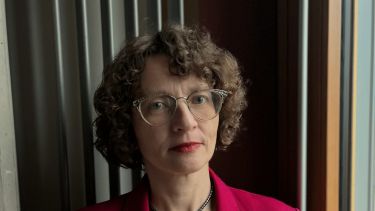About course
During the course, you:
- Will get acquainted with the Cyrillic alphabet and the rules of reading in the Ukrainian language;
- Will learn to pronounce the sounds of the Ukrainian language and combine them into words, and words into sentences;
- Will learn several hundred Ukrainian words and expressions;
- Will understand in general terms how the grammatical system of the Ukrainian language is organized, and you will see common and distinctive features in the grammar of your native languages and Ukrainian;
- Will learn something new about the culture of one of the largest Slavic peoples, whose language ranks 28th in terms of the number of speakers in the world.
The next Ukrainian course will take place starting from Tuesday 24th October 2023 and will run until Tuesday 28th November 2023. It will take place from 17:30-19:30 in Hicks, Lecture Theatre 9. You can apply to take the course here.
About myself
My name is Daria Yakymovych-Chapran. I am an associate professor at the Department of Ukrainian Applied Linguistics at the Lviv National University. I studied at this university as a student and as a graduate student. So, I can call it my native university. My special scientific interests: history of language, etymology, linguistic and regional studies, semasiology, stylistics.
I have been teaching the Ukrainian language to Ukrainian pupils and students for more than 25 years, and for more than 15 years I have been working with foreign students who study the Ukrainian language while studying in Ukraine. Among my students were Poles, Ecuadorians, Congolese, Koreans, Serbians, Vietnamese, Turkmen, Azerbaijanis, Nigerians, Chinese, Ivorians, Ghanaians, Zimbabweans, Thais, Ethiopians. Unfortunately, the Russian-Ukrainian war greatly hinders the educational process in Ukraine and the number of foreign students has greatly decreased, but I hope that after the Victory, our educational cooperation with various countries will resume and become even more intensive than before the war.
Impressions of Sheffield
I arrived in Sheffield on September 30. On the way from Manchester, where I arrived by plane, I had the opportunity to see the grounds of one of Britain's national parks. Both the nature and the villages and towns we passed through are very picturesque. It seems that you have moved into some English novel of the 19th century. I was especially touched by the ancient stone walls that fenced the estates and pastures. It reminded me of my small homeland, Pokuttia, a region in Ukraine located in the middle course of the Dniester River, namely on the banks of the Dniester Canyon, which is also a National Reserve. There is also a long-standing tradition of building such low walls of flat stones around estates. Only in our fields there are no walls, because Pokuttia is a region with extremely rich chernozems, so the land there is not used for pastures, but for growing cereals, sugar beets and sunflowers. It was very interesting to look at sheep and cows, because completely different breeds are common in Ukraine. Scottish cows with long hair and horns of an amazing shape look especially unusual to me.
The city of Sheffield itself is very cozy. You feel calm and protected in it. I like the combination of archaic and modern in the buildings, and also the fact that urban architects do not shy away from creating replicas of buildings in Gothic and other styles. Such buildings organically look against the background of truly ancient churches and houses. The city is very green. One gets the impression that it is not parks and gardens in the city, but the city is in parks and gardens. And, of course, the residents are extremely friendly people, always happy to help and suggest something when you turn to them. I live on the suburb, so all passers-by greet each other there, even though they may not know each other. This custom has survived in Ukraine only in the villages, and I was touched that the people of Sheffield practice it even in a fairly large city.

